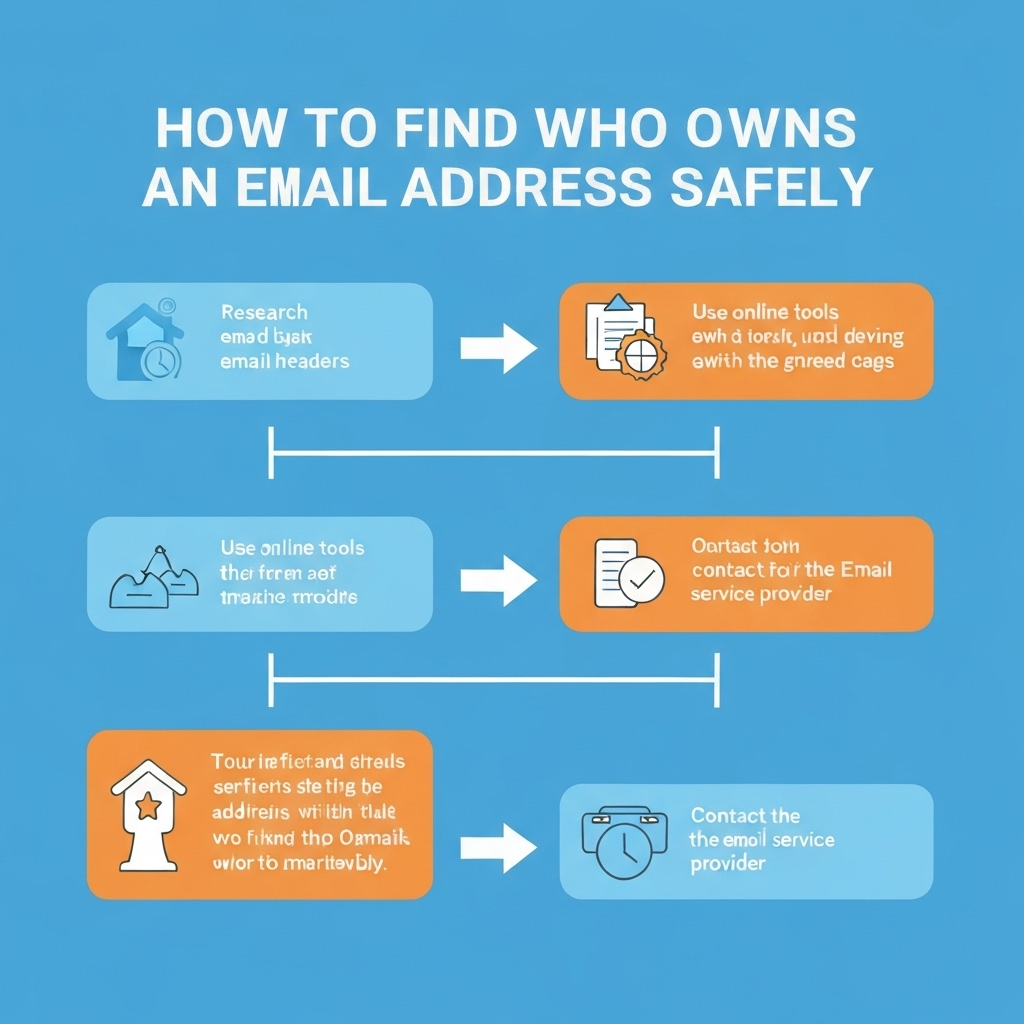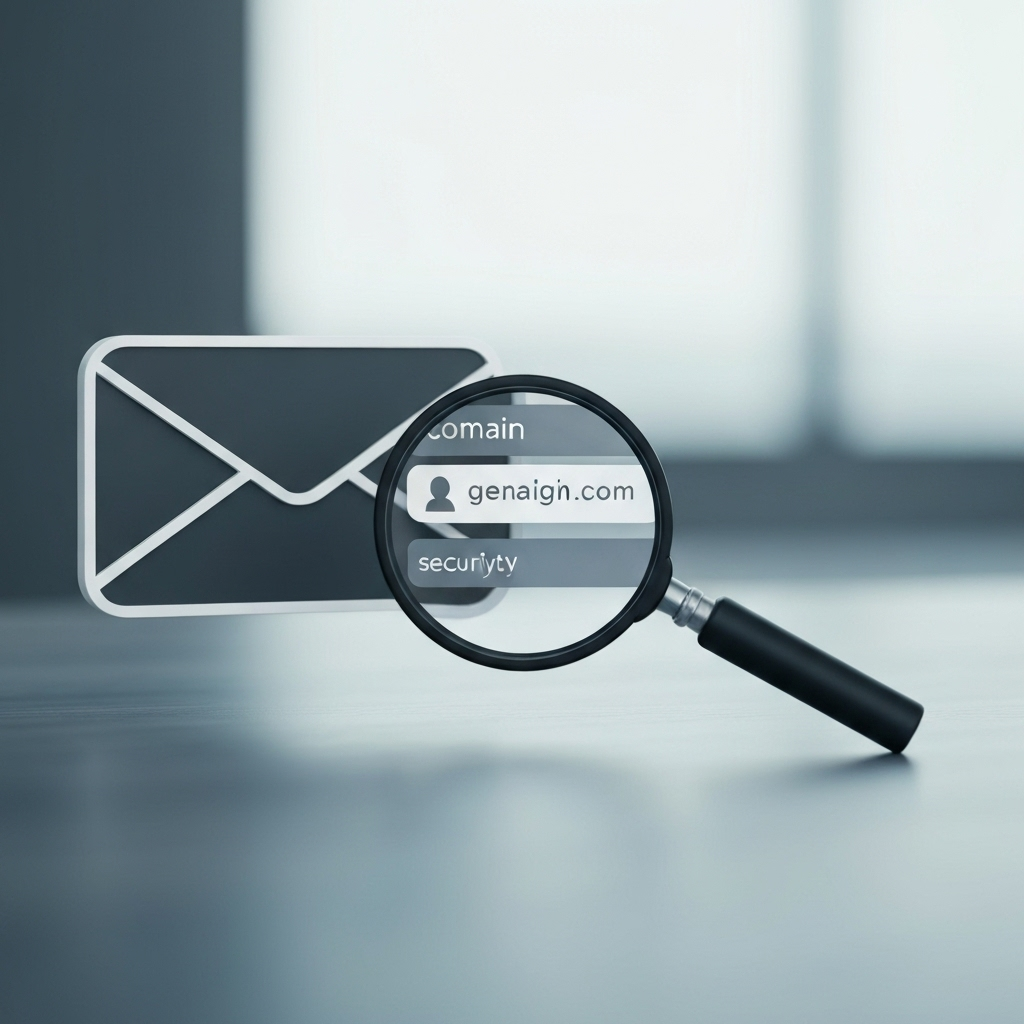How to Find Who Owns an Email Address Safely

In the fast-paced world of business, effective communication is paramount. Whether you're a salesperson trying to connect with a new prospect, a marketer aiming to personalize a campaign, or a professional seeking to build a network, knowing who you're talking to is crucial. But what happens when you encounter an email address without immediate context? How do you safely and ethically discover the person or entity behind it? This is where the art and science of learning how to find who owns an email address comes into play. It's a fundamental aspect of modern contact discovery, essential for anyone looking to enhance their outreach and build stronger professional relationships.
This guide is designed for business professionals who need to navigate this common challenge. We'll delve into legitimate methods, emphasize privacy considerations, and highlight how mastering this skill can significantly boost your business communication efficiency. We'll differentiate between smart investigative techniques and invasive tactics, ensuring you can achieve your goals responsibly.
Understanding Email Ownership and Privacy
Before we dive into the "how," it's vital to understand the "why" and the "what" of email ownership and privacy. An email address, at its core, is an identifier. While it's tied to an individual or entity, its public visibility can vary greatly. Unlike a private phone number, an email address might be listed on a company website, a social media profile, or a public directory. This public association is what allows for legitimate lookups.
However, this doesn't grant carte blanche to probe into personal lives. Data privacy regulations like GDPR (General Data Protection Regulation) and CCPA (California Consumer Privacy Act) set strict boundaries on how personal data can be collected, processed, and used. When you aim to find email owner information, you must operate within these legal frameworks and, more importantly, adhere to ethical standards. The goal is to facilitate legitimate business communication and contact discovery, not to engage in surveillance or unsolicited marketing that infringes upon privacy.
Think of it this way: a public business listing provides information about a company's services. It doesn't give you permission to spam their employees. Similarly, an email address found in a public forum or directory provides a point of contact, but it comes with an implicit expectation of professional courtesy and respect for privacy. Misusing this information can lead to legal trouble, damage your reputation, and undermine trust. As discussed on Quora, while finding an email owner is possible if linked to public profiles, the ethical use of that information is paramount.
Legitimate Methods for Email Address Lookup
There are several straightforward, legitimate avenues to explore when you need to find who owns an email address. These methods often involve leveraging publicly available information or using professional tools designed for this purpose.
- Direct Inquiry (If Possible): If you received an email and are unsure of the sender's identity, the simplest approach might be to reply and ask for clarification. This is often the most direct and respectful method, especially if the context is unclear.
- Company Websites and Directories: Many businesses list contact information for their employees on their "About Us" pages, team directories, or press sections. If you have a company email address, searching the associated company's website is a logical first step. This is a fundamental part of creating a professional presence, as detailed in our guide on how to create a business email address.
- Professional Networking Platforms: Sites like LinkedIn are invaluable for professional contact discovery. While you might not always find an email address directly on a profile, you can often glean enough information (name, company, job title) to perform more targeted searches elsewhere.
- Public Record Searches: For certain types of professional interactions or due diligence, public records might contain relevant information, though this is less common for basic email lookups.
These initial steps are about using common sense and readily accessible public data. They form the foundation before you might consider more specialized tools or techniques for an email address lookup.
Using Online Search Engines and Social Media
Your primary search engines and social media platforms are powerful, often underutilized, tools for uncovering the owner of email addresses. When you need to find email owner details, treat the email address itself as a search query.
Leveraging Search Engines
Simply typing the email address into Google, Bing, or another search engine can yield surprising results. If the email address has been used on public websites, forums, comment sections, or social media profiles that are indexed by search engines, you might find direct links to profiles or mentions of the individual.
- Search Queries: Try searching the email address in quotation marks (e.g., `"[email protected]"`) to find exact matches.
- Contextual Searches: Combine the email address with known information, such as a company name or a person's name if you have a guess (e.g., `"[email protected]" "marketing manager"`).
Exploring Social Media
Social media platforms are goldmines for contact discovery. Each platform has its own nuances:
- LinkedIn: This is the go-to platform for professional networking. While users can choose to keep their email private, many make it visible under their "Contact Info" section. You can also search for the email address directly in the search bar. If the email is associated with a profile, it might appear in the search results. As highlighted by Pipedrive, navigating to a user's profile and looking for the "Contact Info" link is a key step: "On LinkedIn, head to the person’s profile. Just beneath their profile picture, there’s a link that says “Contact Info”. If they’ve made their email address publicly available, it’ll be visible here."
- Twitter (X): Many users include their email in their bio. Even if not, searching for the email address might reveal tweets where the user has mentioned it or responded to someone else using it.
- Facebook: While primarily personal, some professionals use Facebook for networking. Searching the email address might link to a profile if privacy settings allow.
- Other Platforms: Consider industry-specific forums, GitHub (for developers), or other niche social networks where the individual might have a presence.
These methods rely on Open Source Intelligence (OSINT) – gathering information from publicly available sources. As Mailmeteor notes, "Our reverse email lookup employs advanced OSINT (Open Source Intelligence) techniques to identify email address owners. It searches and analyzes publicly available information from multiple online sources." This approach is fundamental to ethical email address lookup.
Leveraging Email Lookup Tools and Services (Ethically)
When manual searches through search engines and social media don't yield results, or when you need to perform these lookups at scale, specialized email lookup tools and services become invaluable. These platforms aggregate data from various sources to provide comprehensive contact information.
How Email Lookup Tools Work
These tools typically work by:
- Data Aggregation: They collect and index vast amounts of data from public websites, social media profiles, company databases, and other publicly accessible sources.
- Pattern Recognition: They use algorithms to identify patterns and links between email addresses, names, companies, and other contact details.
- Verification Mechanisms: Some tools also incorporate checks to verify the existence or validity of an email address, contributing to email verification.
When you use an email lookup tool, you can often input an email address and receive information such as the owner's name, job title, company, LinkedIn profile URL, and sometimes even their phone number. Services like VoilaNorbert, for instance, specialize in finding email addresses but can also help verify existing ones or provide associated details. You can find more information on their approach here: VoilaNorbert - Find Email Addresses.
Another example is Reverse Contact, which explicitly offers reverse email lookup services. Their description states: "A reverse email lookup is a search tool or service that allows individuals to enter an email address in order to retrieve a wide range of information related to the owner of that email."
Ethical Considerations for Tool Usage
While powerful, these tools must be used responsibly. It's crucial to remember that the information provided is derived from public or semi-public data. The primary purpose of using an email lookup tool should always be for legitimate business purposes such as:
- Sales Prospecting: Identifying and verifying contacts for targeted outreach.
- Marketing Personalization: Understanding your audience better to tailor messages.
- Networking: Finding the right people to connect with for collaborations or advice.
- Due Diligence: Verifying professional identities in business dealings.
Never use these tools for spamming, harassment, or any activity that violates privacy laws or ethical business conduct. Always ensure your outreach is permission-based and relevant. Furthermore, the accuracy of these tools can vary. Always cross-reference information when possible and be prepared for incomplete or outdated data. The goal is to aid in legitimate contact discovery, not to intrude.
While email lookup tools help identify contacts, managing and personalizing communications with them is key. Tools like an ai executive assistant can help streamline your workflow, ensuring you make the most of your discovered contacts without getting bogged down in administrative tasks. These advanced solutions can help manage your inbox, schedule follow-ups, and even draft personalized messages, making your outreach efforts more effective and efficient.
What to Do When You Find the Owner (and What Not To Do)
Successfully identifying the owner of email address is only half the battle. How you act on this information is critical for maintaining professional integrity and achieving your communication goals. This is where the practice of verify email sender also becomes important, especially when you are on the receiving end.
What To Do:
- Personalize Your Outreach: Use the information you've gathered to make your communication relevant. Referencing their company, role, or a shared connection shows you've done your homework and aren't sending a generic message.
- Be Clear and Concise: State who you are, why you are contacting them, and what you want. Respect their time by getting straight to the point.
- Focus on Value: Explain what's in it for them. How can your product, service, or idea benefit them?
- Comply with Privacy Laws: Ensure your communication adheres to CAN-SPAM, GDPR, and other relevant regulations, especially regarding consent and opt-out options.
- If Receiving Emails: Use your knowledge to verify email sender authenticity. Look for consistency in their email signature, company domain, and the content of their message.
What Not To Do:
- Do Not Spam: Sending unsolicited, irrelevant, or excessive emails is the quickest way to get blocked and damage your reputation.
- Do Not Harass: Repeatedly contacting someone who has not responded or has indicated disinterest is harassment.
- Do Not Misrepresent Yourself: Be honest about who you are and your intentions.
- Do Not Misuse Information: Never use gathered information for illegal activities, to spread misinformation, or for purposes unrelated to legitimate business communication.
- Do Not Make Unwarranted Assumptions: While an email address might point to an individual, avoid making assumptions about their personal life or intentions based solely on their email or online presence.
Respect and professionalism are key. When you find the owner of email, you gain an opportunity for connection, not a license for intrusion.
How Email Verification Boosts Productivity and Outreach
Learning how to find who owns an email address is closely related to the broader practice of email verification. While lookup tools help identify *who* might own an address, verification confirms *if* an address is valid, active, and deliverable. Both contribute significantly to overall email productivity and outreach success.
Here’s how these practices enhance your efforts:
- Improved Deliverability: Validating email addresses before sending ensures your messages reach their intended recipients. This reduces bounce rates, protects your sender reputation, and prevents your emails from being marked as spam.
- Enhanced Personalization: Knowing the specific individual behind an email address allows for highly personalized communication. When you can tailor your message to their role, interests, or past interactions, engagement rates soar. This is crucial for effective sales and marketing. As discussed in our article on boosting email sales, personalization is a key driver of higher conversions.
- Targeted Outreach: Instead of casting a wide net, you can focus your efforts on the most relevant contacts. This saves time, resources, and improves the efficiency of your sales and marketing teams. Learning to find email owner information helps you target the right decision-makers.
- Increased Efficiency: Automating parts of the contact discovery process and ensuring you're sending to valid addresses means less time spent on manual corrections, bounce management, and dealing with undelivered emails. This directly contributes to faster email search speed, as discussed in another guide.
- Building Trust and Credibility: Professional, targeted communication that lands in the right inbox builds trust. It signals that you are organized, respectful, and understand your audience.
- Better Data Management: Regularly verifying your contact lists and understanding who owns your leads leads to cleaner, more actionable data. This makes your CRM and email marketing platforms more effective.
Ultimately, mastering the techniques to find who owns an email address and ensuring those addresses are valid through email verification transforms your communication strategy from a broadcast to a targeted conversation. This efficiency is further amplified by modern AI tools. For instance, an AI personal assistant for email can help manage your outreach, track responses, and even suggest personalized follow-ups, making your entire communication workflow more productive.
Conclusion: Responsible Email Discovery for Business Success
In the digital age, the ability to find who owns an email address is a valuable asset for any business professional. It unlocks opportunities for targeted sales, effective marketing, meaningful networking, and enhanced professional communication. By employing legitimate methods, from leveraging search engines and social media to utilizing specialized email lookup tools, you can expand your reach and connect with the right people.
However, this power comes with significant responsibility. Always prioritize privacy, adhere to ethical standards, and comply with all relevant laws. The goal is not to intrude but to facilitate legitimate and valuable business interactions. When done correctly, knowing the owner of email information empowers you to create more personalized, relevant, and successful communication.
Embrace these techniques with a commitment to integrity. By doing so, you'll not only improve your outreach effectiveness but also build a reputation for professionalism and trustworthiness, paving the way for sustainable business success. Remember, accurate email verification and responsible contact discovery are cornerstones of modern, efficient, and ethical business communication.
```


